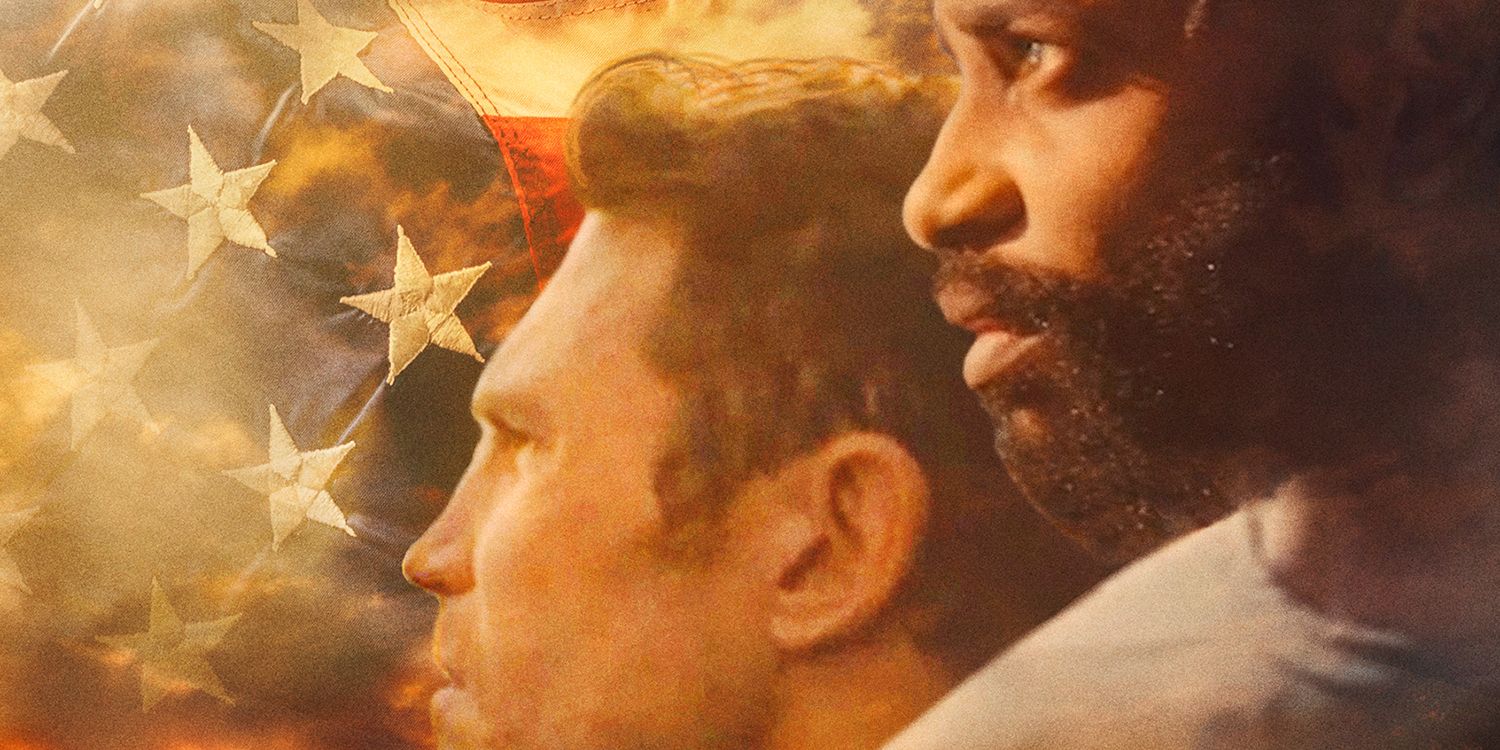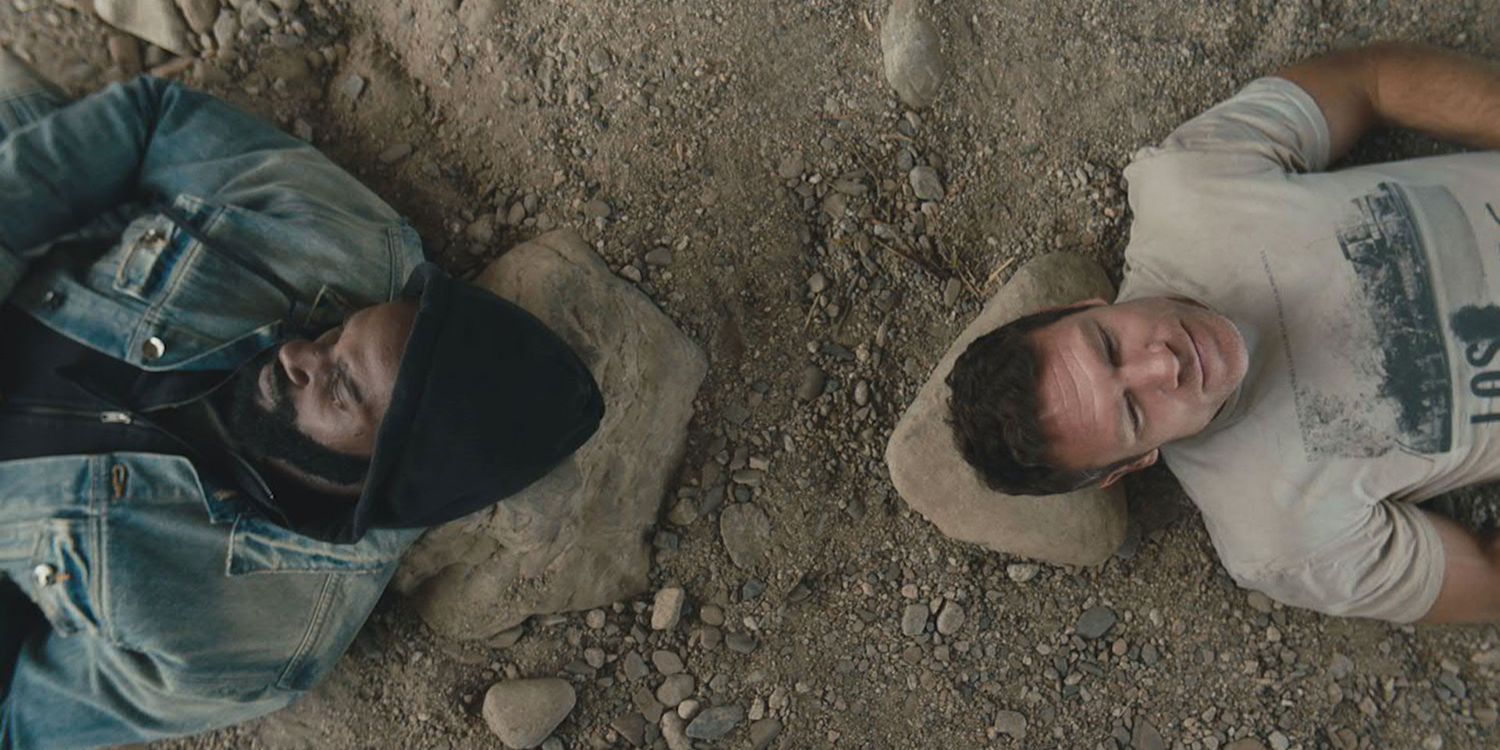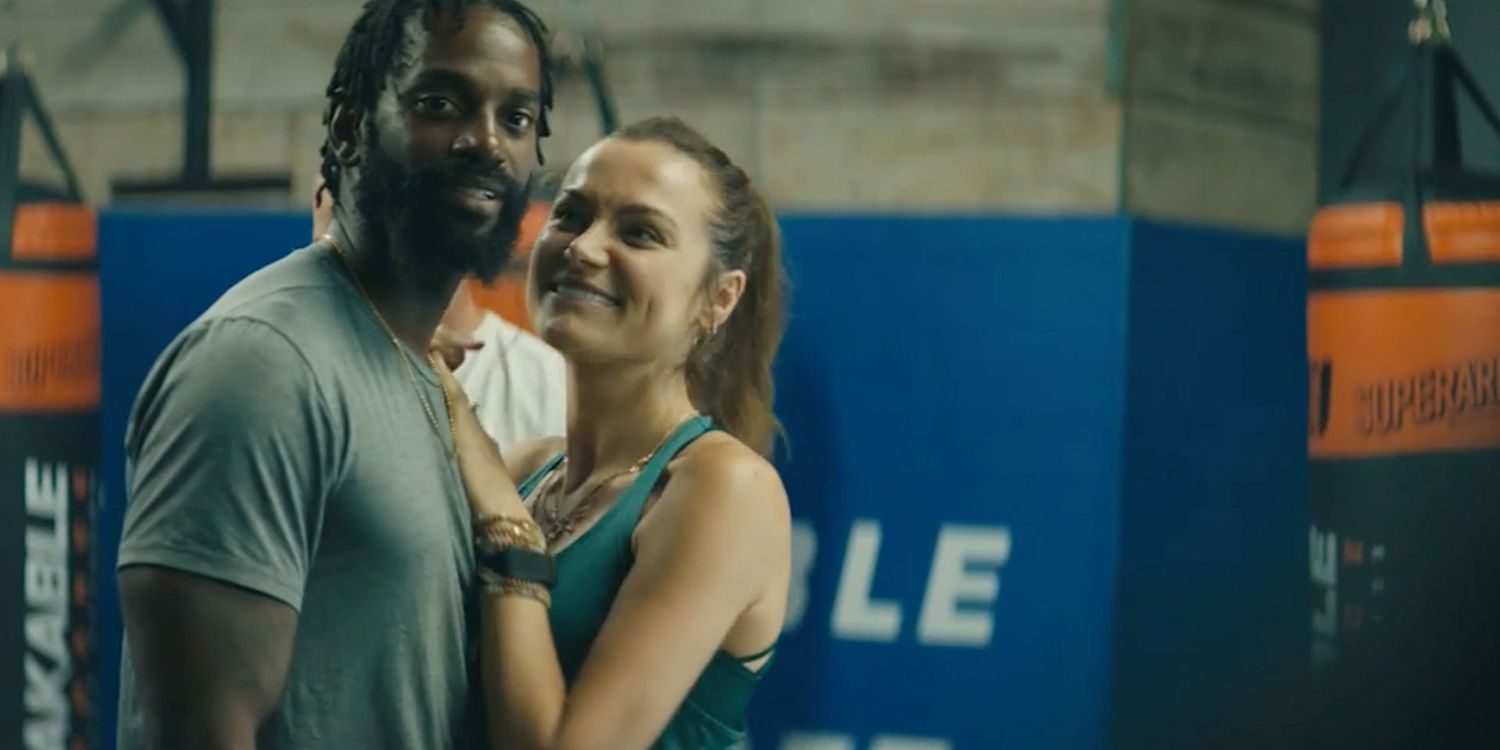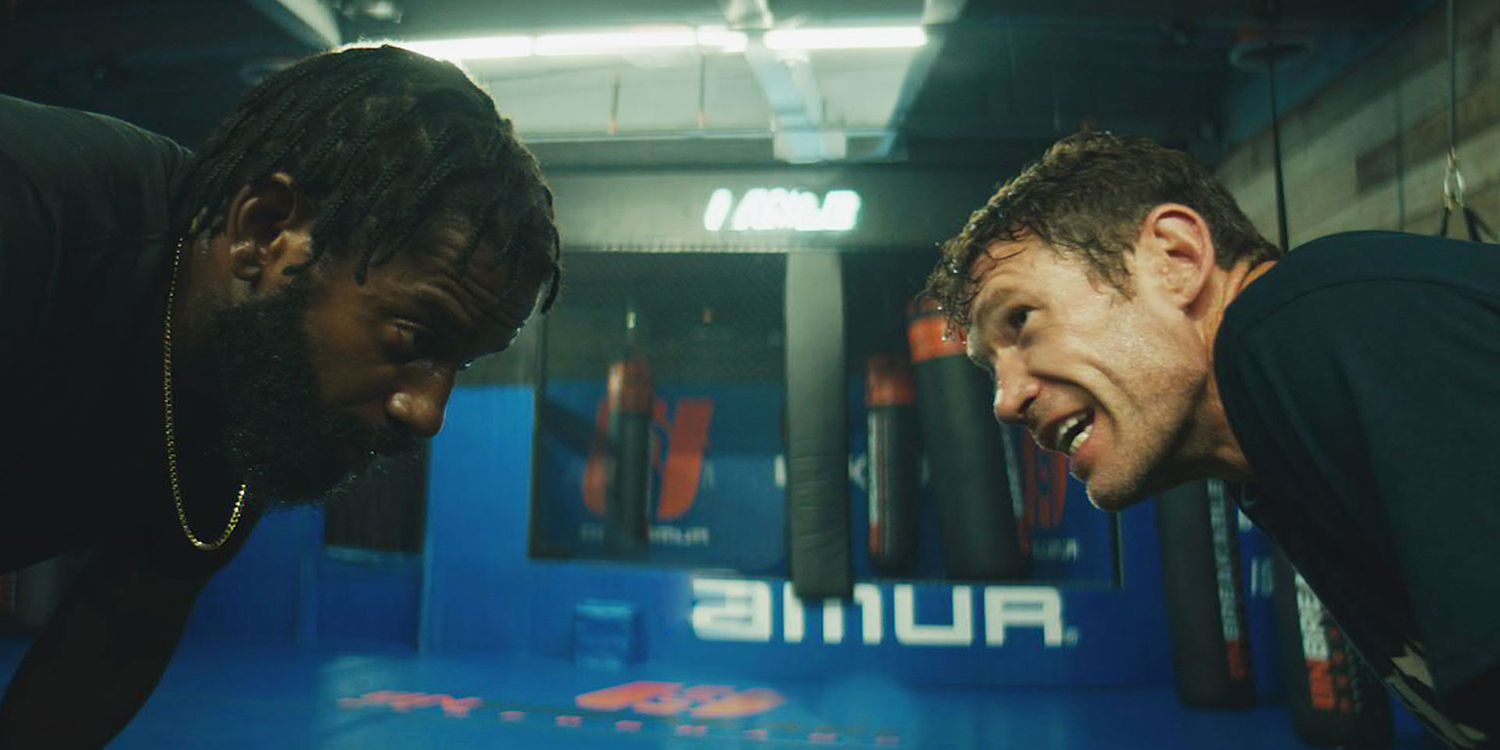Many may not link athletes and veterans together in their minds, but new film MVP makes a strong case for why they both deserve more recognition. Directed by Nate Boyer, who also co-wrote the screenplay alongside Geraint Jones, MVP is a story about a retired NFL player named Will Phillips (played by Mo McRae, The Flight Attendant), who is struggling with life after the game. Upon connecting with a homeless veteran named Zephyr (played by Boyer himself), the two discover a new way to channel their pain.
MVP takes inspiration from the real-life foundation of Merging Vets & Players, which is a nonprofit originally founded by Boyer and Jay Glazer (a sports insider for the NFL). Together, these men and their colleagues seek to help professional athletes and combat veterans find success in their lives after they have moved on to the next phase of their career or completed their time in service. PTSD is known to the general public, of course, but there is often not enough attention or care paid to it by society—and the difficulty of an athlete adjusting to daily life is hardly thought about at all. Nare Boyer and MVP seek to change that mentality.
Check out the trailer for MVP, and read our interview with Boyer below. The veteran and filmmaker shares how his life experience shaped his desire to tell authentic stories, how he collaborated with costar Mo McRae, and the change he hopes this movie helps make.
I really enjoyed MVP, especially the double entendre of the title. Not only does it stand for Most Valuable Player, but also your organization: Merging Vets & Players. What do nonprofit work and activism mean to you, and how do you hope to further it through cinema?
Nate Boyer: Yeah, activism is a tough word. I just know that ever since I took the oath to defend the Constitution and went to serve my country, I became a person of service in some way. Everyone does, and when you leave the military, that's the biggest thing. Beyond the camaraderie and the guys, I was missing that sense of purpose and feeling of fighting for those who can't fight for themselves.
That has to still be a part of what I'm doing in my life. Even if it's storytelling, that has to be an element of the storytelling, or it just doesn't fulfill me. Maybe that comes from a selfish place, because it feels good to do good things. But that is who I am now—good, bad, or indifferent—and I can't be anybody else.
Between football, being a Green Beret, and now directing, you've had a fascinating career trajectory. How did you find yourself here?
Nate Boyer: Ever since I was a little kid, being a professional athlete was my dream. I remember when I was three years old, sitting on the couch and watching a San Francisco Giants baseball game, and dreaming of being one of these players. My mom thought I was seriously psychotic. And that never went away. I just love sports, and I'm still just such a fan. I'll watch any game that's on; I just love being around it.
I remember graduating high school and not really having any offers, so I went a different way and ended up joining the military. But the one sport I never actually played, which I regretted, was football. It was this lingering regret I had, even at 29 years old when I was finally ready to go to college. I was like, "I'm just gonna try out. What's the worst that can happen? I just got back from Iraq, so it can't be worse than that." I trained for it, and I put a lot of work into it. I made the team and eventually found a way on the field; even found a way into the NFL for a little bit.
It's that same mentality with directing. I didn't really have the experience, but I had the desire and the passion and the interest. I love authentic stories, and I don't care how gritty they are. I'm not a huge blockbuster kind of guy, though some of those movies are great. The ones that really speak to me are genuine stories, where I can really relate to the words I'm hearing and the emotions I'm seeing onscreen. There are not a ton of veterans in that space, and not a ton of athletes either. They tell so many of our stories, though, and there's got to be a place for us.
Coming out originally, I had the intent of working at any level. Maybe I'll just be a tactical advisor, or do some acting, or whatever that looks like. Once I was around it and feeling like I was understanding how it works a bit, I built that confidence that maybe I can produce and direct something. This story being our story, with the organization Merging Vets & Players, I interviewed other directors who were awesome. But something in my head just kept telling me I should do it. Also, we didn't have a ton of money. [Laughs] "Well, I don't have to pay this guy."
Something just kept telling me that I can do this. I put a really good team around me, like I had in the military and on the football field. All those people, the other department heads, were mostly veterans as well. They had way more experienced than me, and are probably way more talented and creative and whatever. I gave them autonomy, let them do their thing, and all I had to do was communicate the vision and trust that they can execute it. Which is hard to do.
You are acting as your own tactical advisor, so you can make it even more authentic. Which you did by co-writing. What was that experience and collaboration like?
Nate Boyer: Very collaborative. First of all, Geraint Jones is also a veteran. He served in the British military; he's a novelist and a super talented guy—and one of the fastest writers I've ever met, which is awesome. He'll bang out a 25-page outline in like a day. Not only did we come up with an outline and a first draft, we would send it to a dozen people and get notes. And these are all people like the writer-director of Den of Thieves, [Christian Gudegast,] who I was really lucky to get to know. Also, Mo McRae worked on that movie, which is how that connection came in. Jordan Levine was another really good friend who as worked in various levels of film and television and produced a bunch of stuff. Other people that were more like my peers, and other vets and athletes too. "Just give me your thoughts, ideas, notes. Be brutal." And they would; they were very honest.
It took quite a while and very many drafts to get to where we felt good about it. But that's how it happened. It's our stories. Every word that comes out of these people's mouths are stories we've heard at an MVP session. Both those characters, Will and Zephyr, are composite characters of multiple people. Zephyr's backstory specifically was based on two guys that are still on staff with us and work with MVP. From the number of suicides in their unit to dealing with homelessness and abuse; stuff way before the military, and then going through some really hard stuff in the military. And then Will's story as an athlete is from the football players and the former fighters that have come in to MVP and talked about what that feels like. How embarrassing, in some ways, it felt to even be around the game. "I got cut. I like to say that I retired, but I didn't. My career ended." You think, "I was a bust and a failure," when it's not true. That's just how they feel because of how it ended.
All the vets portrayed onscreen are played by actual vets. Most of the athletes are played by former professional athletes. Mo himself is an athlete. He didn't play professionally, but he gets it. He understood that game and that world. That was super important. Dan Lauria was the dad on Wonder Years, and he was a Vietnam vet with incredible stories. These guys and girls all are part of that, and the story really resonated with them. And that place we filmed at is a real place; a real homeless shelter. It's closed down now, sadly, because they lost some of the funding. Hopefully, this movie helps get those kinds of places back and improves those situations and that narrative.
Speaking of Mo, I love the dynamic between Will and Zephyr. What was it like building that relationship? You built it on the page, and then Mo comes in and adds another layer to it.
Natr Boyer: I'm a people person, I love to get to know people and understand why they feel the way they feel. What makes them upset? What do they want to talk about? What do they gravitate towards? What hurts them? What experiences brought you to this place? Why do you act?
We started talking; we'd hang out and have these chats and get to know each other pretty well. He told me about his family and also about how close he was on some of these incredible projects and films—when we were filming Den of Thieves, there was one movie specifically. He had it, and then something happened and it went another way. He went into that theater by himself and watched that movie on opening night, and it was a very good movie. And he wept. When he told me that story, I'm like, "That is Will Phillips if he were to go to a game, or even watch it on TV by himself, allowing himself to be vulnerable and emotional. It would break his heart that he's not out there." He knows he should be there, and he's good enough. That is him.
That was the biggest thing. Mo was on set every day. He's a producer on this thing as well, and he was on set every day. If he wasn't in front of the camera, he was behind the monitor, helping me figure out what the hell was onscreen. Because it's tough. The whole directing yourself thing is very challenging, and I needed people like Moe to be there and walk me through it. Mo was the heartbeat of the movie in so many ways, from a creative perspective. He calls it collaborative genius, but that guy just shows up and works. That's all you can ask for.
I love how MVP showcases unhealthy versus healthy modes of expressing your aggression or your anger. Is that something you've often found people need help dealing with in your experience?
Nate Boyer: Yeah, that's really hard to do. We're reactive people, and that's something we talk about on the mat and during the huddle in an MVP session. How are we projecting our emotions to the world? And how are they perceived? Because that's something else. Sometimes you think you're putting out a certain energy, and it's not being perceived that way.
I had an experience with that recently with myself, where I thought I was giving constructive criticism, but it turns out the way it was taken was as just being negative. And that's not okay. I need to check myself if that's what's coming out and that's what people are reading from me. That's more important than what I'm saying is coming out. That's a big thing.
But even beyond that, when it comes to healthy ways of exercising anger and stress? Sometimes it's quite literally exercise. Physical exercise, and there's other ways as well. Honestly, making this movie was one of them. It's that creative outlet, being able to scream out what you want to scream out and tell that story and just talk through it. Sometimes it's that simple too. Sometimes it's just going and getting a cup of coffee with somebody. Or it's sitting on the mat in the huddle at MVP with people you feel comfortable with and trust, just talking about what's going on in your life. Communicating it, giving it breath, and getting it out there can really help.
I hope that we get to see you in front of and behind the camera again soon. Is that your hope?
Nate Boyer: Yeah. I want to make another movie so bad. I'm so ready. We filmed this thing mid-pandemic, so it's been a while since that. Obviously, everything worked a little slower during these last couple of years with post-production and everything.
But I'm so ready. Hopefully, this leads to more; that is a goal.
MVP Synopsis
MVP takes place on the streets of Hollywood and centers on the growing friendship between a struggling recently retired NFL player (McRae) and a homeless veteran suffering from PTSD (Boyer). The movie reveals the common challenges faced by military veterans and professional athletes adjusting to a new life once the uniform comes off. With “glory days” behind them, the two men bond in search of real purpose and identity.
MVP premieres tonight in select theaters. To find or host a screening, check out the Merging Vets and Players website.




